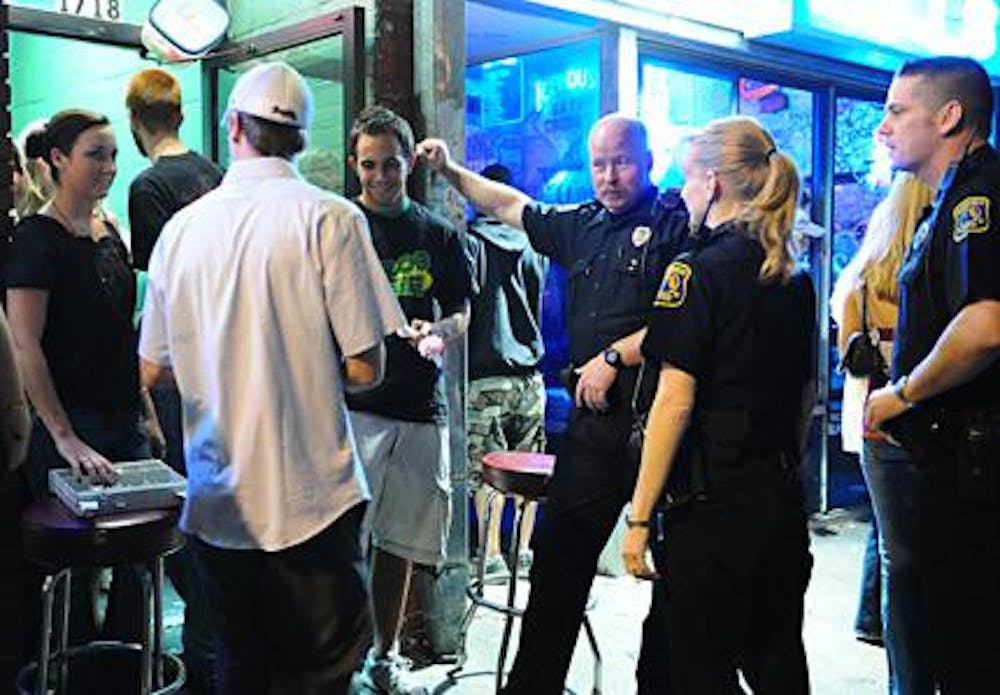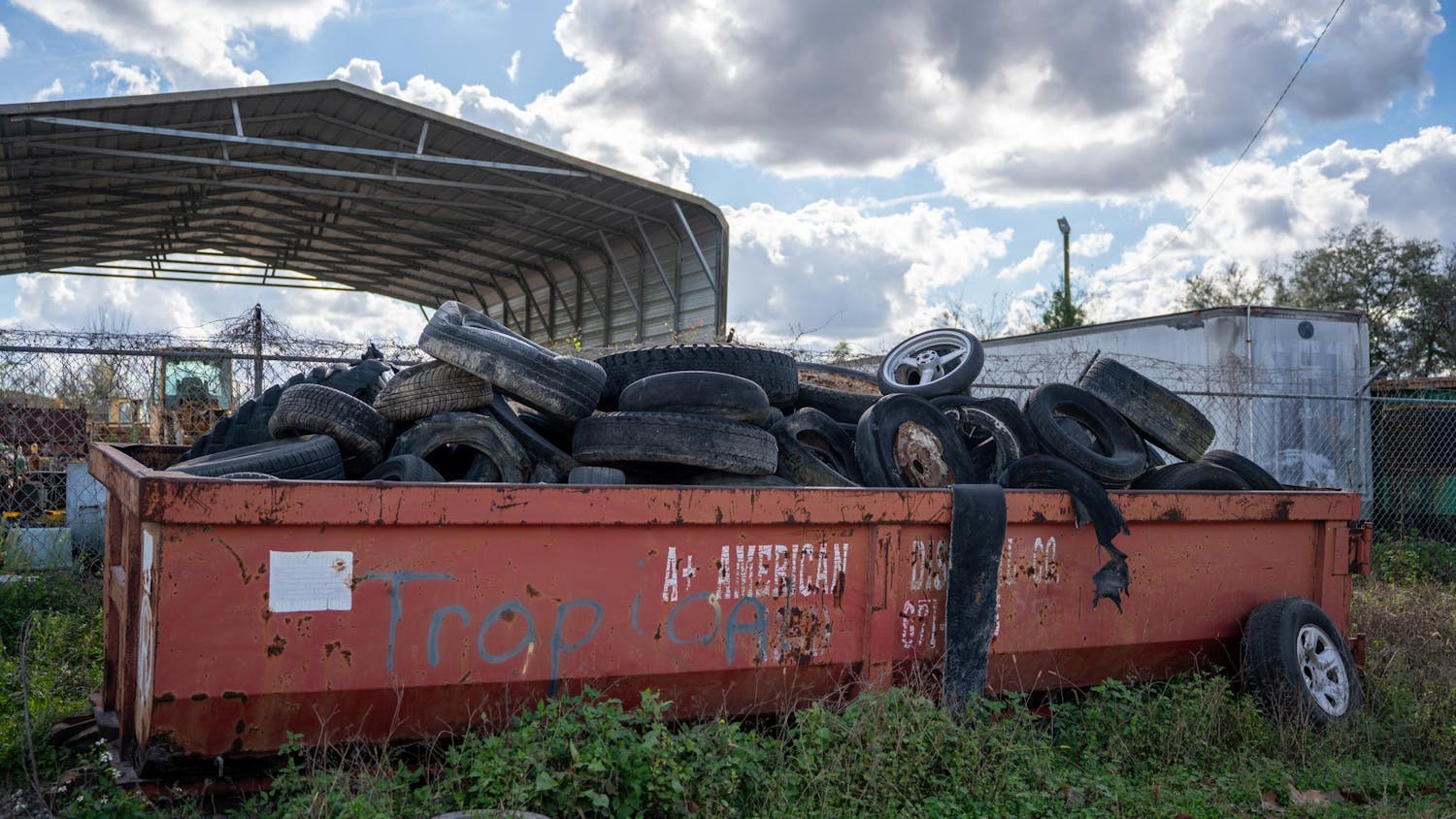Editor's Note: This is the final story in a three-part series on the drinking culture of Gainesville.
Whether it requires more self-restraint, 12-step programs or a week in therapy, various ways of rehabilitating people with alcohol hang-ups are becoming better researched and more well-known these days.
But unfortunately for Gainesville, there are no detox days or self-help books to deal with the drinking problems of an entire city.
With daily arrests and deadly car crashes fresh in their minds, many local officials and residents have singled out drunken driving and underage drinking as major issues in need of the city's full attention.
But those same people - police officers, city commissioners, hospital personnel and UF students - have also found that with problems like these, there are no quick fixes.
So they've come up with their own solutions.
Some of the ideas are simple; many of them are unorthodox. But all of them have the potential to turn the tides on one of Gainesville's most troublesome vices.
Gainesville Guinea Pig
Gainesville, a town with a high student population and lots to celebrate, could be the perfect testing ground for new methods of alcohol crime prevention.
In 2007, the Gainesville Police Department issued 1,009 citations for underage drinking. An anonymous survey distributed by the university stated 16 percent of UF's student participants had driven after drinking - a ratio that, when expanded across the entire campus, would mean about 8,000 students.
And according to Michele Ziglar, the program manager for Shands at UF's trauma center, 38 percent of the center's crash and accident victims in an average year have alcohol in their vehicle or have been drinking themselves.
Given these numbers, most would agree Gainesville is in need of different ways to approach the problem.
But the traditional solution of simply expanding law enforcement would be an unrealistic method of prevention, said University Police spokesman Capt. Jeff Holcomb.
For example, Holcomb said an officer increase on a Gators football game day, when about 100,000 people take to the stadium and the streets with cups in hand, would be logistically impossible.
"How large of a force would you need on that day?" Holcomb said. "What are you going to do with those officers every other day?"
visual

The Police's New Plan
In August of 2007, about four months after a drunken driver hit and killed GPD Lt. Corey Dahlem, the department began a one-year program called the Comprehensive DUI and Underage Drinking Plan.
Partnered with agencies from the state and the university, and funded with hundreds of thousands of dollars from federal grants and the city, the plan was designed from its start with a strict focus on stopping underage alcohol sales and drunken driving in its tracks.
Watching for this kind of activity is nothing new, said Capt. Ed Book, a district commander with GPD who helped develop the plan. Since before the plan was designed, local police have coordinated drunken driving checkpoints, investigated keggers with the department's Party Patrol and even hired a full-time DUI prevention specialist to help keep the roads sober.
But the new plan, with its focus on education as well as enforcement, represents a new approach that police and others have taken to the war on drinking.
The plan called for police to arrange for small advertisements on TV, the Internet and in high school yearbooks. They planned to meet with bartenders, servers and club staff to teach how to deal with problem customers trying to drink underage - places like The Swamp Restaurant on West University Avenue have already undergone training. And they would coordinate volunteer-staffed "SAFE-T Kiosks" downtown and near campus that would steer drunk people to taxis or hospitals rather than jail cells.
Of course, the tried-and-true policing methods of increasing road sobriety checkpoints and neighborhood watches were also listed as components of the plan.
Even so, police and city officials have said it's not always easy to find the necessary manpower to keep the city policed while keeping watch over the downtown drinking scene.
City Commissioner Jeanna Mastrodicasa, who also serves as UF's Assistant Vice President for Student Affairs, said local units have been stretched thin by the city's busy weekend nights.
"A lot of people in Gainesville don't realize that when it comes to bar closing time, police have to pull officers from neighborhood patrol," Mastrodicasa said. "Physically, you can't do it without that amount of people."
visual

Targeting the Taps
Though local police have concentrated their efforts on spreading information and stopping crime, the root problems of drunken driving and underage drinking delve much deeper.
The Gainesville City Commission has continuously acknowledged these alcohol-related crimes as some of the most damaging to the city and the university. But doing something about them has proved a daunting task for even the city's top leaders.
Mastrodicasa said targeting the bars, restaurants and clubs that serve alcohol irresponsibly is one method she hopes the city will pursue further.
Penalizing establishments that repeatedly serve alcohol to customers younger than 21, she said, would have some lasting benefits: It would force the clubs to monitor their sales closer, give police a starting point for where to patrol and reward clubs who follow the rules.
According to data compiled by the police on drinking citations in 2007, patrons of several popular downtown and midtown establishments accumulated the most underage drinking violations: Rue Bar with 134, Rehab with 102, Gator City with 44 and Mojitos with 38.
But while those statistics may single out troublesome bars, they also highlight obstacles for the officers checking them. Many more people are arrested for buying underage than for selling to the underaged, Book said, as it's easier for officers on the scene to check the ages of drinkers than it is to directly link busy bartenders with the drinks they serve.
City officials have also reached a stumbling block in punishing the bars. The city doesn't have full control over the clubs in its expanse because alcohol permits are controlled by the state.
"From an administrative standpoint, it has been really challenging to do stuff with them," Mastrodicasa said. "To take someone's liquor license away … is much more complex and complicated and bureaucratic than you would ever imagine."
She added, however, that there are other steps the city could take to reward law-abiding establishments and rebuke the rest.
She proposes that the city's clubs and bars only allow in people who are 21 and older. However, exceptions could be made for bars with clean track records so that everyone 18 and older could still have a place to spend their free time.
It's an idea that Mastrodicasa says holds promise. Bars with shady histories and lots of underage drinking citations would have constraints placed on their attendance - and, subsequently, their income. At the same time, watchful bars with spotless histories and city permits would be given an advantage over the competition.
"We, as a city, are limited in what we can do," she said. "I really want to make it an incentive to these bars to do a better job."
However, she said some citizens have pushed further.
Why, they asked, introduce the 18-to-21 permits at all? Mastrodicasa responds that legislation prohibiting the underage crowd from going out to clubs could push illegal drinking into unregulated areas, like house parties, and send the wrong message to bars that have, in the past, policed themselves.
Changing the times that bars are allowed to stay open is another idea. Before the City Commission ruled in 1999 that bars should close their doors at 2 a.m., customers were allotted a "cooling down" period during which they could stay in the bars to sober up.
Mastrodicasa thinks the policy should be reinstated, but other commissioners and residents have not been so supportive. They cite the ease in which such a law could be broken and the longer hours for police officers.
Other ideas have recently come to light as possibilities, Mastrodicasa said. Expanding the number of bus stops and Later Gator routes. Making taxi services closer and more convenient. Postponing towing services so people who have been drinking don't feel the pressure to drive.
All are the result of prevention brainstorming sessions from residents and commissioners, yet they remain wishful thinking until the ideas find public backing or the financial funding to follow through.
And that sort of support is becoming harder to find. A $4 million budget cut for the city in 2007, coupled with the $3.1 million the city stands to lose due to the passing of the state's property tax Amendment 1, means money that could go to new (and potentially expensive) ideas is being rationed to save current programs.
'One Little Ad'
The university, with its 50,000 students, many of them underage, has accepted some responsibility for policing alcohol-related activity across the campus and the city.
GatorWell Health Promotion Services, a subsection of UF's Student Health Care Center, has distributed drug-and-alcohol surveys annually in order to quantify risky behavior and to think of better ways to combat it.
And with help from a $280,000 U.S. Department of Education grant, the program has increased focus groups and advertising across campus. Many UF students have seen ads campaigning that "Less is More" and advising students not to be "That Girl" or the "Sketchy Drunk Guy" on buses, in bars or in the Alligator.
As the grant's ad funding nears its end, Tavis Glassman, the center's coordinator for alcohol and other drug prevention, says the ads have developed their own niche in the competition for students' attention.
"Traditional student marketing is stuff like, 'This is what your liver will look like,'" Glassman said. "Old-school ads were just disseminating facts." The ads circulated around UF, he said, have instead focused on more salient issues for students: their relationships, their finances or their behavior.
Though Glassman said he can't be sure yet whether the ads are changing students' minds, he added that he understands the ultimate limit of advertising.
"This is a complex problem," he said, "and one little ad is not going to solve it."
He said he likes ideas like Mastrodicasa's 21-and-up bar limit, as well as registering kegs with serial numbers and having alcohol suppliers bear responsibility for any underage drinking nearby.
But the most important way to curb alcohol crime, he added, is not a new idea at all: increasing the amount of DUI checkpoints local police coordinate per year from about two to at least 10.
"The reality is," he said, "people don't think they're going to get caught."
The Best of the Rest
Others outside the city's most powerful institutions have offered up their own ways to combat underage drinking and drunken driving.
Ziglar at Shands' trauma center said she wants convicted drunken drivers to tour her hospital, trauma center and morgue as part of their legal punishment. AAA Auto Club South and Budweiser sponsored a local designated-driving and towing program for the St. Patrick's Day weekend that would get revelers and their vehicles home safely.
And even some students have organized against drunken driving. Lindsay Keller, a UF junior in health science, helped organize a self-funded group called Gator Ride that will give free rides home to anyone who calls. The service will have a trial run on the weekend of April 11.
"It'll take a while at first," Keller said, "but you know what? It's better than somebody drunk driving home."






